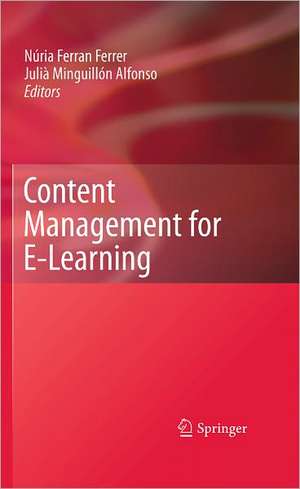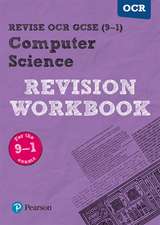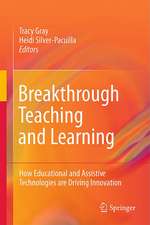Content Management for E-Learning
Editat de Núria Ferran Ferrer, Julià Minguillón Alfonsoen Limba Engleză Hardback – 26 oct 2010
The book focuses on defining content management and its relationship with knowledge management, providing perspectives on how the semantic web could complement content management, how to deal with copyright restrictions, and how to describe information competencies and skills required and acquired by teachers and students in virtual environments. Offered is a design project for managing digital content for classical and distance education institutions, covering all the aspects related to the content lifecycle, integrating it into the learning process. Practical aspects such as standards for content e-learning management, a review of existing experiences of learning repositories, and a survey of available platforms for delivering courses and providing access to information resources is also covered. Lastly, the book addresses the three main factors which make it crucial in the current context: first, the web 2.0 paradigm, which breaks the content producer-consumer barrier; second, the open content movement for educational purposes, which changes the knowledge management transference model; and third, the new European Higher Education Area, where the concept of content needs to be rethought.
| Toate formatele și edițiile | Preț | Express |
|---|---|---|
| Paperback (1) | 626.55 lei 6-8 săpt. | |
| Springer – 3 noi 2014 | 626.55 lei 6-8 săpt. | |
| Hardback (1) | 632.64 lei 6-8 săpt. | |
| Springer – 26 oct 2010 | 632.64 lei 6-8 săpt. |
Preț: 632.64 lei
Preț vechi: 744.28 lei
-15% Nou
Puncte Express: 949
Preț estimativ în valută:
121.13€ • 126.13$ • 100.50£
121.13€ • 126.13$ • 100.50£
Carte tipărită la comandă
Livrare economică 14-28 februarie
Preluare comenzi: 021 569.72.76
Specificații
ISBN-13: 9781441969583
ISBN-10: 1441969586
Pagini: 232
Ilustrații: XIV, 215 p.
Dimensiuni: 155 x 235 x 25 mm
Greutate: 0.5 kg
Ediția:2011
Editura: Springer
Colecția Springer
Locul publicării:New York, NY, United States
ISBN-10: 1441969586
Pagini: 232
Ilustrații: XIV, 215 p.
Dimensiuni: 155 x 235 x 25 mm
Greutate: 0.5 kg
Ediția:2011
Editura: Springer
Colecția Springer
Locul publicării:New York, NY, United States
Public țintă
ResearchCuprins
Introduction.- PART I: Conceptual framework.- 1. Theoretical perspectives on content management.- 2. From content management to e-learning content repositories.- 3. Learning Objects, Content Management and E-learning.- 4. Relationship between Pedagogical Design and Content Management in eLearning.- 5. Information related competences for teachers and students in e-learning environments.- 6. Copyright issues in e-learning.- PART II: Case studies and practical issues.- 7. Developing content management projects.- 8. Survey on learning content management systems.- 9. e-Learning standards for content management.- 10. Quality issues and strategies for evaluation.- 11. Open Educational Resources: Motivations, Logistics and Sustainability.- CONCLUSIONS: Content management and e-learning: a strategic management perspective.
Textul de pe ultima copertă
From the shift to learner-centered education to the sharing of online resources among colleges and universities, virtual learning has brought sweeping change to the educational experience. New information and communication technologies are bringing fresh challenges in terms of organizing and delivering content—particularly with the advent of Web 2.0 and the ability of learners to author their own content. Accordingly, many educators, departments, and institutions are unsure how best to commit the large amounts of money, time, and resources that go into such an upgrade. Content Management for E-Learning offers thorough coverage of the conceptual, technical, pedagogical, and budgetary issues for readers first grappling with the new concepts of information competence as well as those at schools already involved in new technologies and seeking improvements to their current systems. Chapters provide a theoretical and practical framework for effectively providing access to resources, matching content management to knowledge management, and more, including these key features: •An overview of the widely-used Learning Content Management System.•Case studies in content management projects.•A peer evaluation model for open educational resources.•Technical standards and specifications for content management.•An administrative model for implementing e-learning.•Copyright and intellectual property issues involved in producing e-content.
Content Management for E-Learning is an up-to-the-minute blueprint and idea book for producers and consumers of learning content (eg. Students, teachers, lecturers and librarians), for educational institutions and eLearning centres and for those tracking the redefining of teaching and learning or contributing to this process.
Content Management for E-Learning is an up-to-the-minute blueprint and idea book for producers and consumers of learning content (eg. Students, teachers, lecturers and librarians), for educational institutions and eLearning centres and for those tracking the redefining of teaching and learning or contributing to this process.
Caracteristici
Addresses content management in the e-learning sector from both theoretic and pragmatic approaches Provides case studies and practical solutions for designing a project for managing content Provides standards for content e-learning management Provides a review of existing experiences of learning repositories Gives a survey of available platforms for delivering courses and providing access to information resources Includes supplementary material: sn.pub/extras




